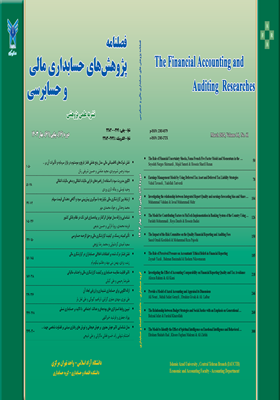-
-
List of Articles
-
Open Access Article
1 - The Role of Financial Uncertainty Shocks, Fama French Five Factor Model and Momentum in the Capital Market and Its Effects on Stock Returns
Seyedeh Narges Shirmardi Majid Sameti Hossein Sharifi Renan -
Open Access Article
2 - Earnings Management Model by Using Deferred Tax Asset and Deferred Tax Liability Strategies
Vahid Tavasoli Yadollah Tariverdi -
Open Access Article
3 - Investigating the relationship between Integrated Report Quality and earnings forecasting bias and Share Price Informativeness
Muhammad Vahdani Javad Muhammadi Mehr -
Open Access Article
4 - The Model for Contributing Factors to FinTech Implementation in Banking System of the Country Using the Blended Approach
Farideh Mohammadi Roya Darabi Hossein Badiei -
Open Access Article
5 - The Impact of the Risk Committee on the Quality Financial Reporting and Auditing Fees
Saeed Omidi Kordsholi Mohammad reza Pajoohi -
Open Access Article
6 - The Role of Perceived Pressure on Accountants' Ethical Beliefs in Financial Reporting
Zeynab Yazdi Bahman Banimahd Hashem Nikoomaram -
Open Access Article
7 - Investigating the Effect of Accounting Comparability on Financial Reporting Quality and Tax Avoidance
Alireza Rahimi Ali Kiani -
Open Access Article
8 - Provide a Model of Aural Accounting and Appraisal its Dimensions
Ali Nouri Mehdi Safari Gerayli Ebrahim givaki Ali Lalbar -
Open Access Article
9 - The Relationship between Budget Strategies and Social Justice with an Emphasis on Generational Accounting
Behzad Jafari farshid khirolahi -
Open Access Article
10 - The Model to Identify the Effect of Spiritual Intelligence on Emotional Intelligence and Behavioral Tendencies Based on Personal Judgment to Improve the Decision-Making Process of Investors
Ehtsham Shahabi Rad Khosro Faghani Makrani Ali Zabihi
-
The rights to this website are owned by the Raimag Press Management System.
Copyright © 2021-2025







